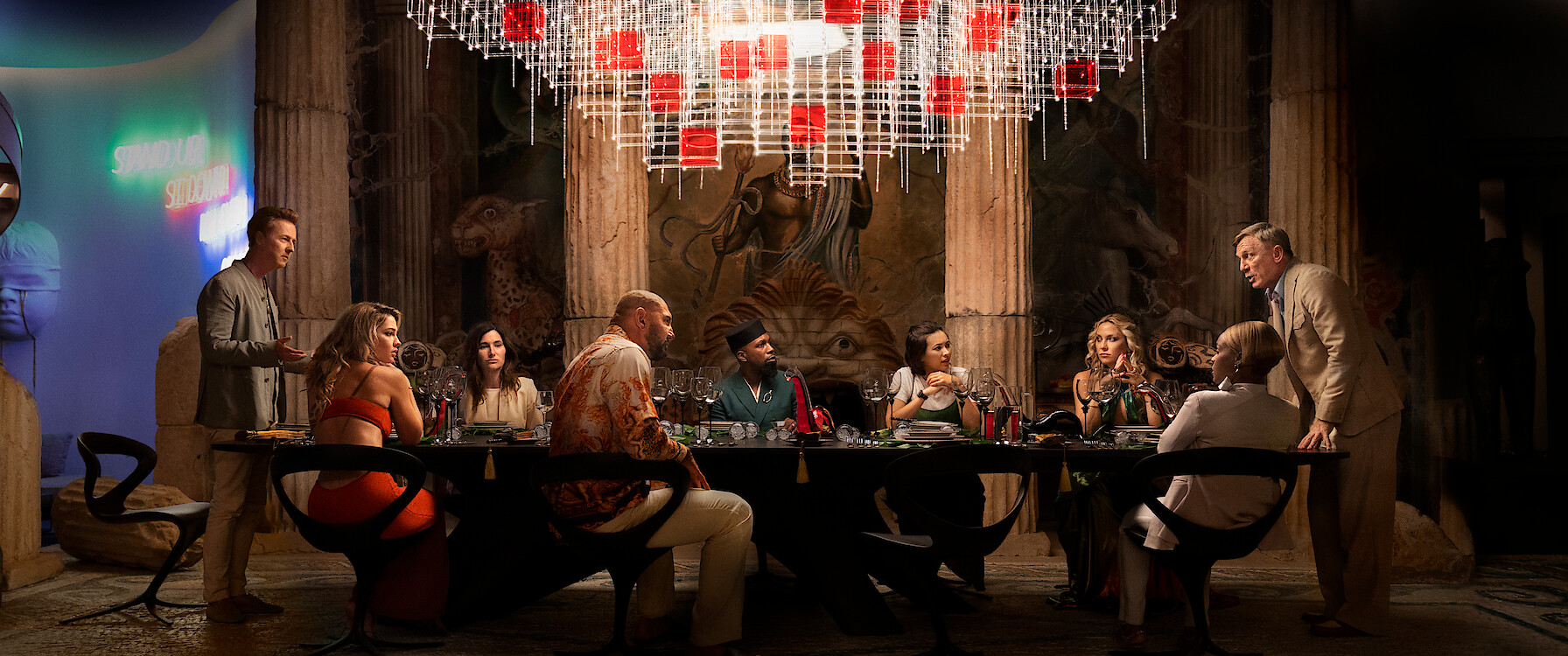It doesn’t take a detective to figure out that Glass Onion: A Knives Out Mystery (2022) had large shoes to fill. With a razor-sharp script, an eerie-yet-charming Agatha Christie-esque ambience, and dynamic characters who break free from the mystery genre’s one-dimensional Clue archetypes, Knives Out (2019) was not only a top-tier whodunit, but was also a nearly flawless film. After creating such a masterpiece, director Rian Johnson was faced with an undeniable challenge this time around: how to make a satisfying sequel after such a strong first installment.
The solution proved to be quite simple—to minimize the potential comparisons between the two films, Johnson tells a very different type of story from his first film. Although he brings back the delectable Detective Benoit Blanc (Daniel Craig) and the central murder plotline, he otherwise gives himself the freedom to start from scratch. This was a good decision; the fact that these films vary so greatly gives each of them a chance to shine.
In many ways, Knives Out is a claustrophobic film. Marta Cabrera (Ana de Armas) feels constricted by her inescapable guilt surrounding the circumstances of Harlan Thrombey’s (Christopher Plummer) death, and the suspect list is almost entirely limited to the Thrombey bloodline—those with the most to gain from Harlan’s demise. Glass Onion, on the other hand, takes a page out of The Chicks’ book; despite a similarly insulated group of suspects, its scope and setting embraces wide open spaces. The titular metaphor and large, lavish set cleverly allude to the fact that the answers the viewer craves are hiding in plain sight: at the center of a transparent onion. Set on Bron’s private island, the pièce de résistance is the literal glass onion atop his mansion, a grandiose lair where he can scheme and survey his empire. While the glass onion image refers to the nature of the film’s mystery, the symbol’s fragility also mirrors the precarity of Bron’s empire, an empire which is one red envelope away from cracking into a million pieces.
Glass Onion’s setting in the summer of 2020 also sets it apart from other mystery movies. Set against the backdrop of the COVID-19 pandemic, the film feels like a kind of modern period piece. While many are often quick to write off COVID-related references in media as “cringey,” Johnson masterfully integrates this watershed moment in history in order to weave in social commentary about internet culture and wealth. In addition to casual references to Zoom classes, Among Us, and mask-wearing, Johnson concerns himself with capturing the contemporary cultural pull towards self-centeredness. An egocentric “canceled” influencer throws a huge house party at the beginning of the film, claiming that the hundreds of attendees are all “in her pod.” The pseudointellectual billionaire at the mystery’s center consistently misuses big words in pathetic attempts to establish superiority over his much smarter (but less wealthy) peers. Lastly, the film warns us about the malleable nature of “truth” in the modern era, since billionaire Bron proves himself capable of using his power and influence to perpetuate any lie by surrounding himself with people of questionable moral fiber who are indebted to him.
The first Knives Out installment packed a lot of star power with its ensemble cast: Jamie Lee Curtis, Chris Evans, and LaKeith Stanfield are just a few of the names that come to mind. While the incomparable Ana de Armas and Chris Evans are dearly missed, it’s hard to complain when this ensemble boasts names like the fantastic Kate Hudson, Janelle Monáe, and Leslie Odom, Jr. Glass Onion leans into comedy to create a narrative that is equal parts hilarious and riveting. Standout Hudson perfectly portrays the self-absorbed yet fiercely fabulous diva Birdie Jay, and Kathryn Hahn imbues her character, Claire Debella, with her signature animated expressions and dry wit. Edward Norton plays the clearly Elon Musk-inspired Miles Bron, a billionaire we love to hate. He’s an absolute buffoon, selfish and self-aggrandizing with a performative “linguistic finesse” which crumbles once you actually whip out the dictionary and call his bluff. And yet, we can’t help but be mesmerized by him, caught helplessly in his magnetic, enigmatic orbit. Gen-Z superstar Madelyn Cline from the Netflix series Outer Banks seems like she would stick out like a sore thumb amongst this more seasoned cast, but she holds her own and provides a refreshing youthful flair as Whiskey. Although Odom Jr., Dave Bautista, and Jessica Henwick blend into the background a bit, overshadowed by many of the more ostentatious characters, they still provide a firm foundation as members of the supporting cast.
While everyone in the cast does a great job, Daniel Craig and Janelle Monáe just cannot help but steal the show with their grounded, organic performances. Firstly, Detective Benoit Blanc is an absolute trip. I could honestly listen to Blanc unravel life’s mysteries in his crisp Southern accent for hours—Craig studying with an accent coach for four months really paid off. Blanc is the glue that holds this franchise together, making him the backbone of this film. Craig balances warmth and wit with ease, crafting a character palatable enough to be widely beloved while never crossing into stale territory. Furthermore, Monáe puts their all into this performance, flipping between outrage, grief, and cunning contemplation without missing a single beat. Like de Armas in Knives Out, Monáe’s chemistry with Craig is characterized by simple sincerity—both of their characters can only truly let down their guards and regroup when in one another’s company.
Monáe particularly shines in the film’s final scene. After the big reveal (a reveal which, to quote Birdie, is “so dumb it’s brilliant”) Glass Onion ends in a blaze of glory—literally. While the twist is not nearly as savvy writing-wise as Knives Out’s, watching Bron’s empire go up in flames after the truth is disclosed nevertheless makes for a satisfying conclusion thanks to its high production value and its swift take-down of an insufferable antagonist Bron’s hubris leads to the demolition of both his mansion and—the final nail in his coffin—the world-famous Mona Lisa. With flashy special effects and a masterful incorporation of Nat King Cole’s rendition of “Mona Lisa,” the film ends on a melodramatic yet memorable note. Glass Onion’s campy, cathartic, ending works because it challenges the notion that revenge is a dish best served cold and unapologetically embraces its own absurdity, turning a typically bleak genre on its head by refusing to take itself too seriously.
Glass Onion doesn’t reinvent the wheel when it comes to the murder mystery genre, but it certainly does push the envelope in an exciting way, making its nomination for Best Adapted Screenplay at the 95th Annual Academy Awards well-deserved. With intelligent scripts and all-star casts, both installments in Johnson’s film series stand in opposition to the opinion that the whodunnit should be put to pasture. Though Johnson has now forayed into TV with Poker Face, a Knives Out-esque mystery series on Peacock starring Natasha Lyonne, fans who love watching Benoit Blanc tame the temperaments of entitled heirs and petulant billionaires over the course of two thrilling hours must now wait patiently until 2024 for the release of Knives Out 3.





